Teen Gets In Trouble With Her Parents For Siding With Her Friend On Dog Training
Every dog owner has their own method of training their beloved pet, and while it may not be the same as someone else's, it should be respected. It is important to remember that each dog and owner have their own unique relationship and approach to training, and it is not appropriate to interfere with someone else's chosen method.
Interfering with someone else's training plan can be detrimental to the relationship between the dog and the owner. It can create confusion and mistrust and can even lead to behavioral issues.
If someone is having difficulty with their dog's behavior, it is best to provide advice and guidance from a distance. Suggesting different methods of training and offering support can be helpful, but taking control of the situation is not appropriate.
OP and her parents own two dogs, and she feels that her parents treat them a little harshly, but they still love them to bits. During New Year's, OP went to a family friend's house, where she met her friend's six-month-old puppy.
Whenever the puppy did something that could be considered bad behavior, her dad would yell at the puppy instead of letting her friend handle the situation. OP's friend then got defensive and asked them to stop yelling at her dog, which killed the mood and led to them leaving.
In the car, when OP's parents asked her opinion on the incident, OP said that it was her friend's dog, and she was allowed to train it however she wanted. This led to her parents becoming upset, which they still are a few days later.
OP is now wondering if she was in the wrong for agreeing with her friend instead of her parents.
OP asks:

OP and her parents own two dogs, and she feels that her parents treat them a little bit harshly, but they still love them to bits.

During New Year's, OP went to a family friend's house, where she met her friend's six-month-old puppy.

Parenting Styles and Their Impact on Children
Parental expectations around discipline and training can vary widely, leading to conflicts between children and parents. Dr. Anne Thompson, a child psychologist at MIT, notes that differing beliefs about discipline often stem from cultural backgrounds and personal experiences.
Her research reveals that these conflicts can evoke significant emotional responses, especially in adolescents who are forming their identities.
As they navigate these tensions, teens may express loyalty to their friends over family, as seen in this scenario.
Whenever the puppy did something that could be considered bad behavior, her dad would yell at the puppy instead of letting her friend handle the situation.

This kept going on throughout the night.

OP's friend then got defensive and asked them to stop yelling at her dog. They got angry and left.
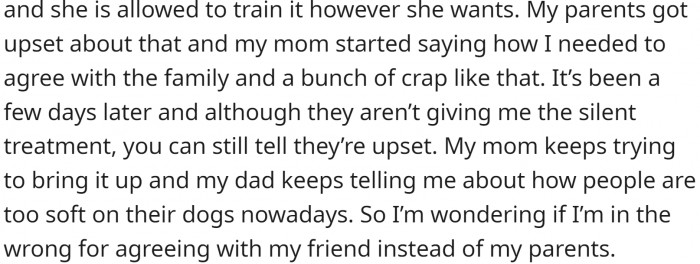
When parents impose rigid training methods, it can lead to resistance from children who feel misunderstood. Studies indicate that children who feel unsupported in their choices often experience increased levels of anxiety and rebellion.
Research published in the Journal of Child Psychology and Psychiatry highlights the importance of fostering autonomy in children to promote healthy emotional development.
OP has offered the following explanation for why they think they might be the asshole:

This Redditor was blunt:

OP replied:
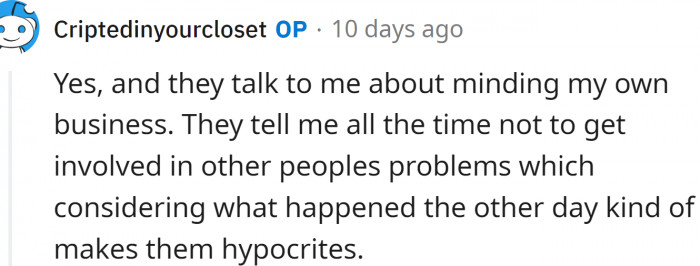
Fostering Healthy Parent-Child Communication
To navigate these differences effectively, fostering open communication is crucial. Parents can benefit from discussing their expectations and the reasons behind their training methods with their children.
Engaging in collaborative discussions about training approaches can help parents understand their child's perspective and reduce conflict.
Research shows that families who communicate openly about expectations tend to experience greater satisfaction and lower levels of rebellion.
They are sticking their noses in other folks' business in other folks' home.
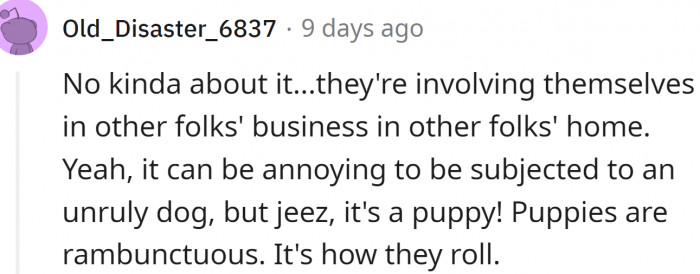
"Her dog, her prerogative to train her."
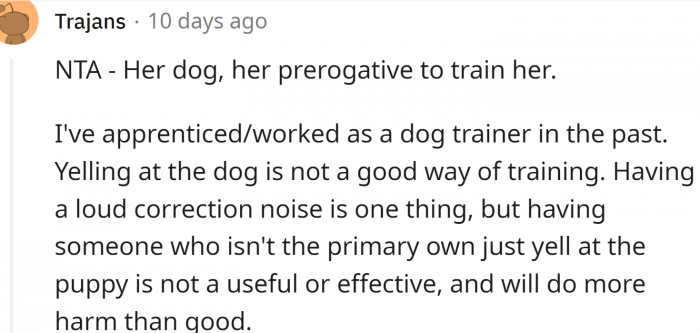
"Resorting to yelling, especially at someone else's dog, is very bad."

Additionally, allowing children to express their opinions and preferences can promote a sense of agency. Parents can encourage dialogue by asking open-ended questions and validating their children's feelings, even if they disagree.
Building trust through respectful conversations can strengthen the parent-child bond and foster a supportive environment.
"Terrible house guests." That is an understatement.
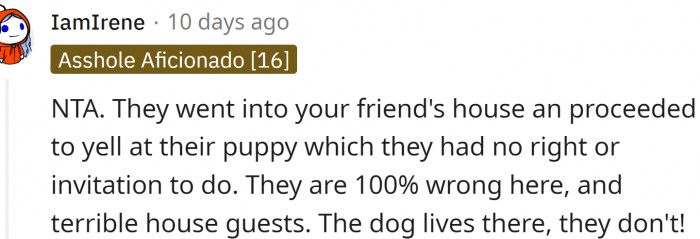
OP has a right to their own opinion.

It is clear that OP is right here. Her parents had no business disciplining someone else's dog in someone else's home.
Dog owners should be allowed to make their own decisions when it comes to training their pets. Everyone approaches training differently, and it is important to respect those differences.
By respecting each other's chosen training methods, we can ensure that our furry friends receive the best care possible.
Psychological Analysis
This scenario illustrates the common conflicts that arise from differing parenting philosophies. The teen's desire to side with a friend suggests a need for autonomy and validation of her feelings.
Encouraging parents to engage in conversations about training methods can help bridge the gap between differing beliefs.
Analysis generated by AI
Analysis & Alternative Approaches
Understanding the dynamics between parenting styles and children's responses is essential for fostering healthy relationships. Research emphasizes the importance of open communication and support in navigating these tensions.
Ultimately, promoting autonomy and understanding can lead to stronger parent-child relationships.



